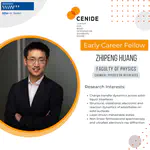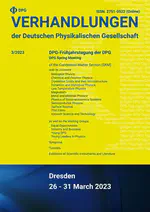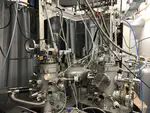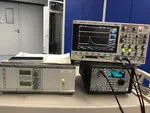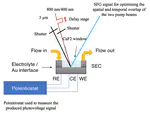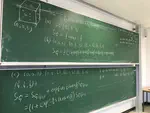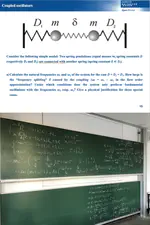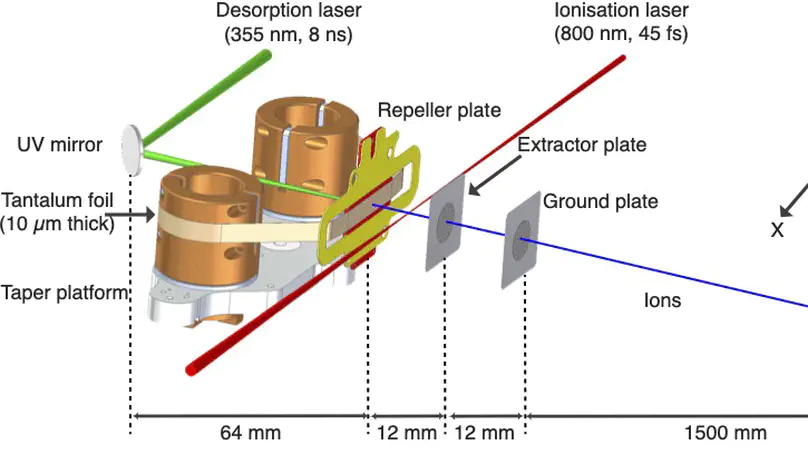Biography
Dr. Zhipeng Huang received his doctoral degree (Dr. rer. nat.) from University of Hamburg/DESY in 2019. He is currently a staff laser scientist (tenured position) at the DELTA Center for Synchrotron Radiation / Faculty of Physics, TU Dortmund University, and a guest scientist at the Faculty of Physics, University of Duisburg-Essen. His research interests focus on revealing the ultrafast electron and nuclear/lattice dynamics of samples after optical excitation with ultrafast imaging and spectroscopy techniques. He is highly skilled in UHV apparatus development, device control, data acquisition/analysis automation, laser-driven molecular source development, ultrafast electron diffraction, mass spectrometry, non-linear optics/spectroscopies, etc., and has developed/constructed several state-of-the-art scientific instruments (e.g. Anal Chem 90, 3920-3927 (2018), Structural Dynamics 9, 054301 (2022), Rev Sci Instrum 95, 063903 (2024)) to perform these cutting-edge research. He has comprehensive expertise in ultrafast electron/optical/X-ray imaging and laser spectroscopies.
Download my resumé.
- Ultrafast Electron Diffraction
- Ultrafast Sum-Frequency Generation Spectroscopy
- Surface Science
- Solid-Liquid/Solid-Gas Interfaces
-
PhD in Physics, 2019
DESY/University of Hamburg
-
Visiting Scholar, 2013
Colorado State University
-
BSc in Physics, 2011
Shandong University
Skills
90%
100%
90%
90%
90%
90%
Experience
Advisor: Prof. Dr. Richard Kramer Campen
Accomplishments include:
- Successfully constructed and built the Ultra-High Vacuum (UHV) system which integrates Low Energy Electron Diffraction (LEED), Auger Electron Spectroscopy (AES), Thermal Desorption Spectroscopy (TDS), (Time-Resolved) Sum Frequency Generation Spectroscopy, etc.
- Constructed and set up time-resolved sum-frequency generation spectroscopy for UHV and ambient/electrochemical sample environments
- Study the ultrafast process happens at solid-gas/solid-liquid/liquid-gas interface
Advisor: Prof. Dr. R. J. Dwayne Miller
Accomplishments include:
- Coupled a desorption by impulsive vibrational excitation (DIVE) molecular source with a femtosecond electron gun to study the structural dynamics of large biomolecules
- Constructed and commissioned the gas-phase/solid-phase ultrafast electron gun
- Built the pump-probe femtosecond laser paths for the UED experiments
- Developed tools for electron diffraction experimental data analysis with Matlab and Python
Advisor: Prof. Dr. James R. Sites
Accomplishments include:
- Upgraded the Colorado State University (CSU) Light-Beam Induced Current (LBIC) system to characterize the uniformity of local photovoltaic performance of thin-film solar cells
- Investigated the efficiency loss mechanism of thin-film solar cells with carefully characterization from (temperature dependent, illumination dependent) IV, QE, CV, LBIC, etc.
Recent News
Research
Developed Software
Featured Publications
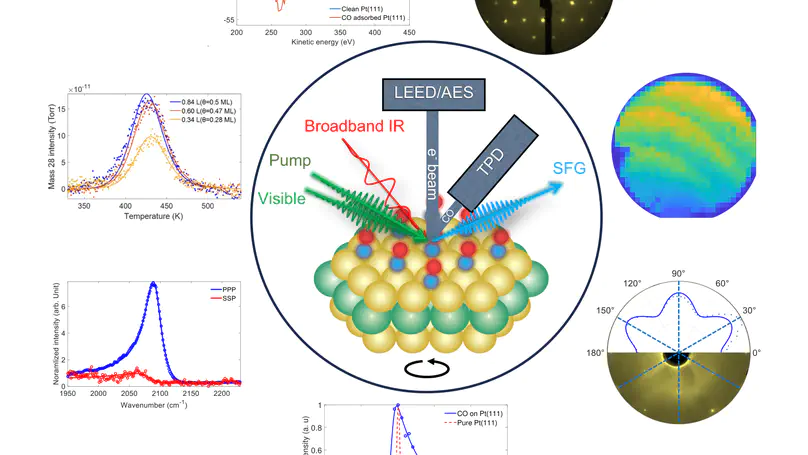
In this contribution, we reported the development of an ultra-high vacuum setup that integrates conventional surface science techniques with azimuthal and polarization-dependent, femtosecond time-resolved sum-frequency generation spectroscopy and scanning sum-frequency generation microscopy. With a series of proof-of-principle measurements of CO adsorbed on Pt(111) and of the clean Ag(111) surface, we demonstrate that the setup offers 34 fs temporal resolution to perform time-resolved SFG spectroscopy, sufficient manipulator stability to perform scanning SFG microscopy on ~40 μm length scales, and flexible sample rotation to perform azimuthal-dependent SFG spectroscopy. This setup allows for the full characterization of the nonlinear susceptibility under equilibrium and femtosecond optically excited non-equilibrium conditions, as well as temperature control and sample preparation/characterization of conventional UHV setups.
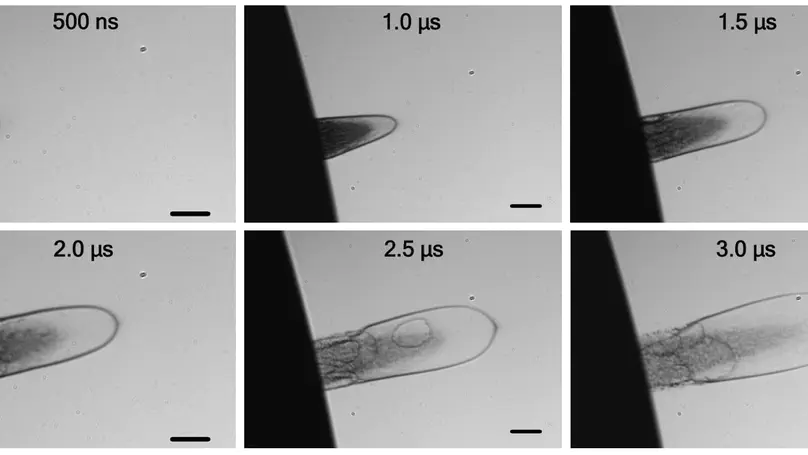
Upon deformation, Newtonian fluids are expected to exhibit viscous behavior, and only when deformed on very short timescales, below the molecular diffusion time of a single molecule, is a solid-like elastic response expected. We have revealed a strong, rubber-like elasticity in the Newtonian fluid glycerol by analyzing the dynamics of a laser-driven free surface bubble. Not only do we find an elasticity persistent for four orders of magnitude longer than the diffusion time but also observe tolerance to large deformations only found in rubber-like materials. Our observations are independent of surface tension and require the existence of a transient state with solid-like long-range correlations different from the bulk state. This invites us to revisit our understanding of the liquid state.
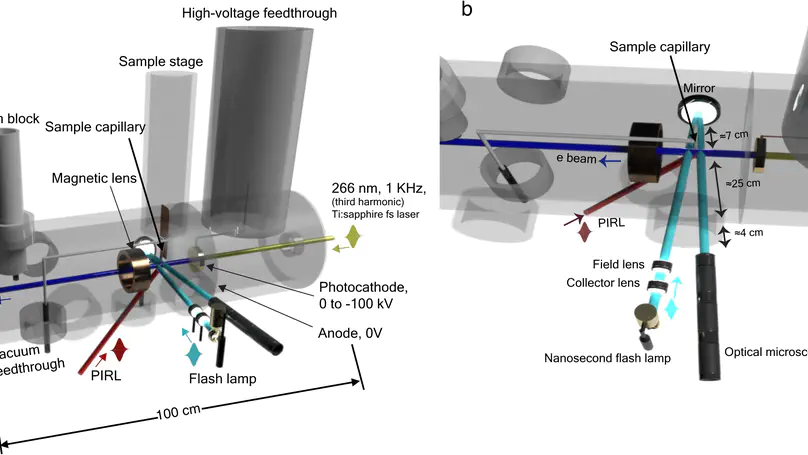
Laser driven molecular beam concept provides time separable nanoscale liquid phase and gas-phase sample delivery under identical conditions to enable atomic imaging using electron sources and determination of solvation effects.
Recent Publications
Contact
- zhipeng.huang@tu-dortmund.de
- +49 (0)231 755-5388
- Maria-Goeppert-Mayer-Str. 2, Dortmund, 44227
- DELTA building, ground floor, room 16
-
Monday - Thursday 9:00 to 19:00
Friday 09:00 to 18:30 - Book an appointment
- DM Me
- Zoom Me














